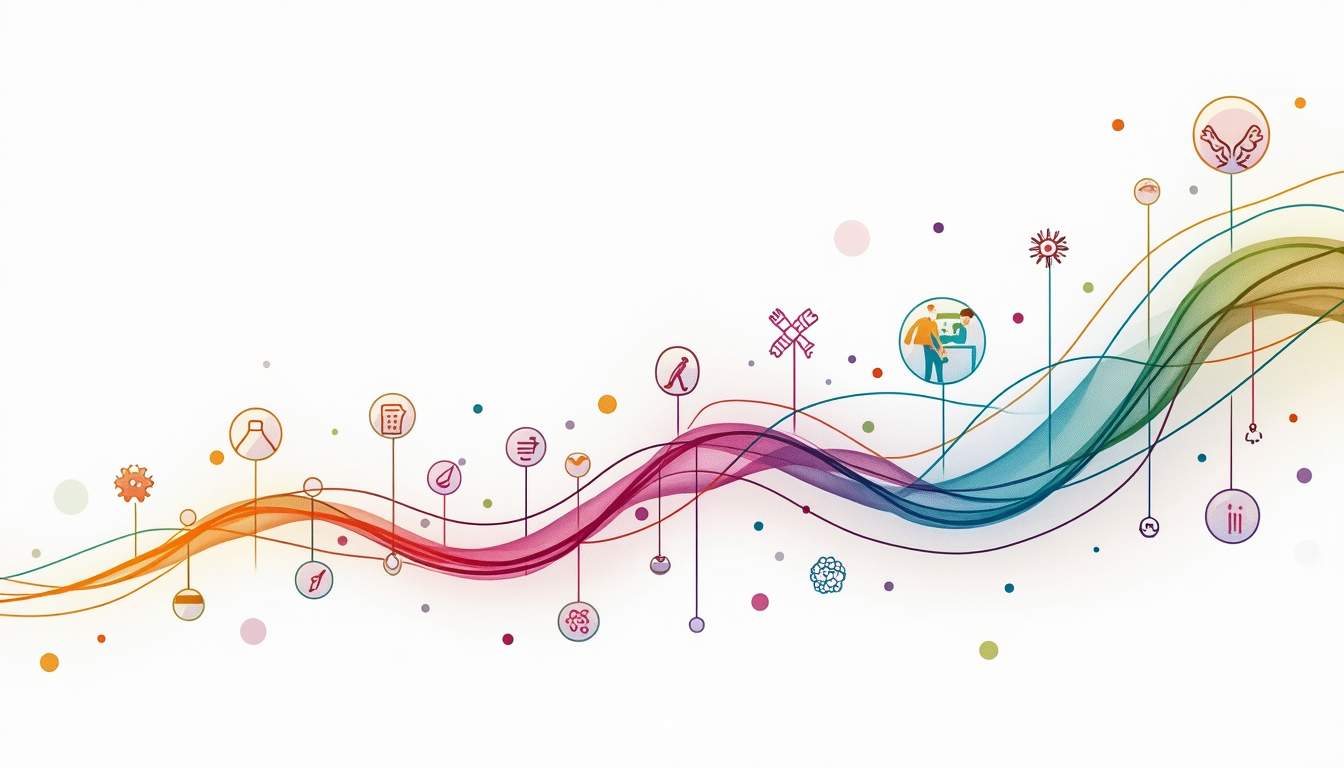In today’s fast-paced world, health and wellness have become more important than ever. Yet, the traditional one-size-fits-all approach to healthcare often falls short in addressing individual needs. What if your health insights could adapt and grow with you, reflecting changes in your lifestyle, environment, and body? Personalized health insights that evolve with you are transforming how people understand and manage their well-being, offering tailored guidance that is as unique as each individual.
The Rise of Personalized Health: Moving Beyond General Advice
For decades, health advice has largely been generalized, designed to apply broadly across populations. While this approach has its merits, it often overlooks the nuances that make each person different. Factors such as genetics, metabolism, lifestyle habits, and even mental health influence how we respond to diet, exercise, and medical treatments.
Personalized health insights aim to bridge this gap by using data-driven approaches to deliver recommendations tailored specifically to an individual’s unique profile. This shift is powered by advances in technology, including wearable devices, genetic testing, and artificial intelligence, which collectively enable a more precise understanding of health.
Why General Health Advice Isn’t Enough
General health guidelines like eating five servings of fruits and vegetables daily or getting 150 minutes of moderate exercise per week are valuable starting points. However, they don’t account for individual differences such as allergies, chronic conditions, or personal goals. For example, someone with gluten intolerance needs different dietary advice than someone without it, and an athlete’s nutritional needs differ significantly from a sedentary person’s.
Moreover, health is dynamic. What works at one stage of life may not be suitable later on. Personalized health insights recognize this fluidity, adapting recommendations as your body and circumstances change.
Furthermore, the integration of personalized health extends beyond just physical wellness; it encompasses mental and emotional well-being as well. By leveraging data from various sources, including sleep patterns and stress levels, personalized health approaches can offer holistic strategies that address both mind and body. For instance, a tailored wellness plan might suggest mindfulness practices for someone experiencing high levels of stress, while also recommending specific dietary changes to support mental clarity and emotional balance.
This comprehensive view of health is increasingly supported by research, which shows that individuals who engage with personalized health strategies often experience better outcomes. They are more likely to adhere to health recommendations when they feel that the advice is relevant and applicable to their unique situations. As we continue to embrace this personalized approach, the potential for improved health outcomes becomes even more promising, paving the way for a future where health is not just about surviving, but truly thriving. To learn more, you can visit the following link: https://aspedan.com/
How Technology Enables Evolving Health Insights
The foundation of personalized health insights lies in the collection and analysis of diverse health data. Modern technology has made it easier than ever to gather real-time, continuous information about an individual’s health status, habits, and environment.

Wearable Devices: Your Health Companion
Wearable technology, such as fitness trackers and smartwatches, plays a crucial role in monitoring key health metrics like heart rate, sleep patterns, physical activity, and even stress levels. These devices provide a constant stream of data that can be analyzed to detect trends and changes over time.
For example, if a wearable detects a decline in sleep quality over several days, it might suggest lifestyle adjustments or relaxation techniques to improve rest. Similarly, tracking physical activity levels can help tailor exercise recommendations that align with current fitness status and goals. Beyond fitness, some wearables now include features that monitor blood oxygen levels and ECG readings, providing deeper insights into cardiovascular health. This integration of advanced metrics empowers users to take proactive steps in managing their health, potentially alerting them to issues before they escalate.
Genetic Testing: Unlocking Your Unique Blueprint
Genetic testing has become more accessible and affordable, offering insights into inherited traits that influence health. Understanding your genetic predispositions can inform personalized strategies for nutrition, exercise, and disease prevention.
For instance, some individuals metabolize caffeine differently or have varying sensitivities to certain nutrients. Genetic insights can guide dietary choices that optimize energy levels and reduce the risk of chronic diseases. Importantly, these insights evolve as new research emerges, ensuring that recommendations remain current and evidence-based. Furthermore, genetic testing can also reveal information about potential responses to medications, allowing healthcare providers to prescribe treatments that are more effective and have fewer side effects, thus enhancing the overall quality of care.
Artificial Intelligence and Machine Learning: Making Sense of Complex Data
The sheer volume of health data collected can be overwhelming without sophisticated tools to interpret it. Artificial intelligence (AI) and machine learning algorithms analyze patterns across multiple data points, generating actionable insights tailored to the individual.
These technologies can predict potential health risks before symptoms appear, suggest personalized interventions, and adjust recommendations based on ongoing data inputs. This dynamic feedback loop ensures that health guidance is not static but evolves in response to real-world changes. Moreover, AI can enhance telemedicine by enabling virtual health assistants to provide immediate responses to patient inquiries, analyze symptoms, and even triage care based on urgency. As these technologies continue to advance, they hold the promise of transforming healthcare delivery into a more efficient, responsive, and personalized experience for patients everywhere.
Benefits of Health Insights That Grow With You
Personalized health insights that evolve with the individual offer numerous advantages over traditional approaches. They empower people to take control of their health proactively and make informed decisions that reflect their unique needs.

Improved Health Outcomes Through Tailored Interventions
By considering an individual’s specific characteristics and circumstances, personalized insights enable more effective interventions. Whether it’s a customized nutrition plan, a targeted fitness routine, or a medication regimen optimized for genetic factors, tailored approaches can lead to better health outcomes.
For example, a person with a family history of diabetes might receive personalized dietary advice and monitoring strategies that help prevent or delay the onset of the condition. This proactive approach can reduce complications and improve quality of life.
Greater Engagement and Motivation
When health advice feels relevant and personalized, individuals are more likely to engage with it consistently. Seeing how lifestyle changes impact their own metrics—such as improved sleep quality or reduced resting heart rate—can be highly motivating.
This ongoing feedback fosters a sense of ownership and accountability, encouraging sustained healthy behaviors rather than short-term fixes.
Adaptability to Life’s Changes
Life is full of transitions—new jobs, moving to different climates, aging, or changes in family dynamics. Personalized health insights that evolve with you take these factors into account, adjusting recommendations as circumstances shift.
This adaptability ensures that health guidance remains relevant and practical, helping individuals navigate challenges without losing sight of their wellness goals.
Real-World Applications: Personalized Health in Action
Personalized health insights are no longer theoretical concepts; they are actively shaping healthcare and wellness practices across the globe.
Chronic Disease Management
For people living with chronic conditions like hypertension, diabetes, or asthma, personalized health insights can be life-changing. Continuous monitoring through wearable devices and mobile apps allows for real-time tracking of symptoms and vital signs.
Healthcare providers can use this data to adjust treatment plans promptly, reducing hospitalizations and improving patient outcomes. Patients also gain a deeper understanding of how their behaviors affect their condition, empowering them to make better choices daily.
Fitness and Nutrition Tailored to You
Fitness enthusiasts and casual exercisers alike benefit from personalized workout plans based on their current fitness level, goals, and preferences. Apps and devices analyze performance data to suggest optimal training intensity, duration, and recovery strategies.
Similarly, personalized nutrition plans consider individual dietary restrictions, preferences, and metabolic responses. This approach helps people achieve their goals more efficiently, whether it’s weight management, muscle gain, or improved energy.
Mental Health and Stress Management
Personalized health insights extend beyond physical well-being to encompass mental health. Wearables that monitor heart rate variability and sleep patterns can provide clues about stress levels and emotional health.
Coupled with AI-driven apps offering mindfulness exercises, cognitive behavioral therapy techniques, or mood tracking, individuals receive tailored support that evolves with their mental health needs.
The Future of Personalized Health Insights
As technology continues to advance, the potential for personalized health insights will only grow. Emerging innovations promise even deeper integration of data sources and more sophisticated analysis.
Integration of Environmental and Social Factors
Future health insights will increasingly incorporate environmental data such as air quality, weather, and social determinants of health. Understanding how these external factors influence well-being will enable more comprehensive and context-aware recommendations.
Enhanced Predictive Capabilities
With improvements in AI, predictive models will become more accurate, identifying health risks earlier and suggesting preventive measures tailored to the individual’s evolving profile. This shift from reactive to proactive healthcare could revolutionize disease prevention and management.
Greater Privacy and Data Security
As personalized health relies heavily on sensitive data, ensuring privacy and security will be paramount. Advances in encryption, decentralized data storage, and user-controlled data sharing will empower individuals to benefit from personalized insights while maintaining control over their information.
Conclusion: Embracing a Health Journey That Evolves With You
Personalized health insights that evolve with you represent a paradigm shift in how health and wellness are understood and managed. By leveraging technology, data, and individual uniqueness, these insights provide dynamic, relevant guidance that adapts to life’s changes.

Embracing this approach means moving beyond generic advice to a more empowered, informed, and proactive way of caring for oneself. As the tools and knowledge continue to advance, everyone has the opportunity to experience health insights that truly grow with them—supporting a lifetime of well-being.




